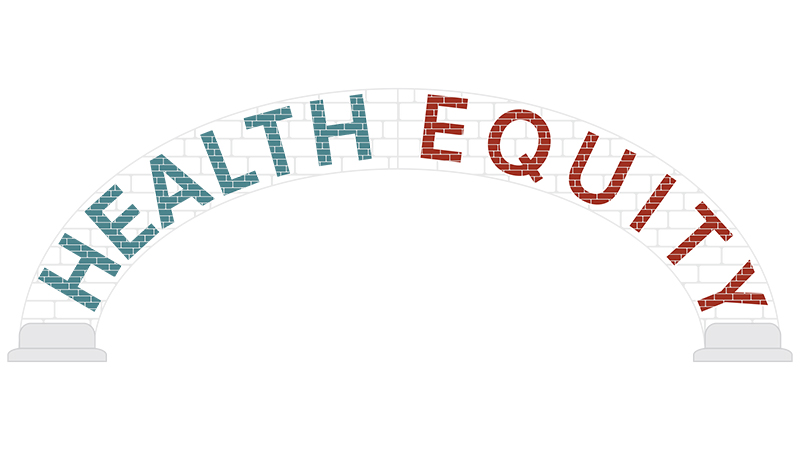Bridging Health and Equity

Colorado organizations are working together to address social, economic and environmental determinants of health. Illustration by Rachel Mondragon
By Kristin Jones
More than 2.2 million Americans were incarcerated in 2013, by the most recent count of the U.S. Bureau of Justice Statistics.
How many of them come from small towns in rural northwestern Colorado? Statistically, very few.
But Lisa Brown, who heads the Northwest Colorado Health, a health care provider, heard something that resonated during a workshop on incarceration in Denver earlier this month. With psychiatric beds and other mental health services hard to come by in rural Colorado, the jails there are filling up.
“People are being inappropriately imprisoned when they need mental health services,” said Brown, sparking a conversation with Juston Cooper of the Colorado Criminal Justice Reform Coalition. Jail staff may have no idea what kinds of training and mental health support might be available to them or inmates, said Cooper, ticking off a list of resources.
Traditionally, many direct health care providers have had little formal contact with the other organizations that exist to serve their most vulnerable clients, such as community organizers, criminal-justice advocates or school watchdogs. But as research increasingly supports the idea that inequities in health outcomes are bred by social and economic factors outside the doctor’s office, organizations in Colorado are working to forge bonds and share expertise.
Earlier this month, 17 direct-service, community organizing and policy advocacy organizations came together in Denver to work toward a common vision of equity in health outcomes, digging into factors like the particular hurdles faced by refugees and immigrants, police presence in schools, and transportation barriers as they impact the health of Coloradans. The Colorado Trust sponsored the gathering, which is part of a larger effort to build lasting ties among disparate organizations that work toward health equity in the state.
“We want to move the needle on inequality in Colorado,” said Eliana Mastrangelo, a community organizer for Together Colorado, a faith-based advocacy organization based in the metro area. “We can’t do that unless we’re thinking long-term.”
In another workshop, Daniel Kim of Padres & Jóvenes Unidos shared the nonprofit’s research on how young kids go from minor offenders in the classroom to jails and prisons: Students are sometimes brought to jail directly, when police arrive in squad cars to punish schoolyard offenses, or they may be suspended so often that they are pushed out of school and into the criminal justice system.
The patients in safety-net clinics, said Kim, “are the same communities who are dealing with this in their schools.”
One of the groups most at risk for harsh disciplinary measures is refugee children. That’s something Savina Treves recognized. As child refugee services coordinator with Aurora Mental Health Center, she treats refugee children, and said that school staff can often unknowingly exacerbate anxiety in kids who are dealing with trauma and cultural disorientation.
She suggested to Kim that Padres & Jóvenes Unidos could help in Aurora, extending another connection in a day full of them.
As policymakers and legislators geared up for this session on Capitol Hill, and a presidential election year roared in the background, this was a place to shift focus to the long view.